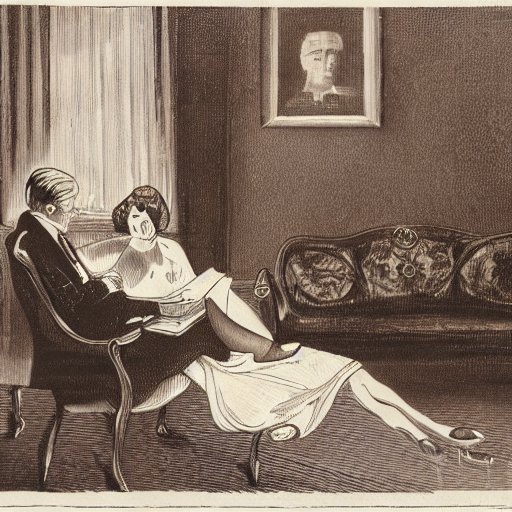8th Apr 2023
The Psychology of Fashion: How Clothing Choices Affect Our Behavior and Self-Perception

The world of fashion is not just about style, trends, and aesthetics; it is also deeply connected to psychology. The clothes we wear have the power to influence our behavior, emotions, and self-perception. In this article, we will explore the fascinating connections between fashion and psychology, focusing on the reasons behind our clothing choices and the impact they have on our lives.
The Impact of Clothing on Mood and Emotions
The concept of "enclothed cognition" refers to the influence of clothing on our cognitive processes. Research has shown that our clothing choices can impact our mood, emotions, and even our performance in various tasks. For instance, wearing a formal suit might make someone feel more professional and confident, while wearing a casual outfit might make them feel more relaxed and comfortable. The colors of the clothes we wear can also have an impact on our mood, as certain colors are associated with specific emotions, such as red with passion and energy or blue with calmness and stability.
The Power of Dressing for Success
Dressing for success is not just an old adage; it is backed by scientific research. Studies have shown that dressing professionally can have a positive impact on our self-esteem, confidence, and performance. A study conducted by researchers at Northwestern University found that participants who wore a white lab coat, which symbolizes professionalism and attentiveness, performed better on attention-related tasks than those who did not wear the coat. This demonstrates the importance of dressing appropriately for different situations, as it can help us feel more capable and prepared for the challenges we may face.

The Role of Personal Style in Self-Expression
Our personal style is an important aspect of our self-expression, allowing us to communicate our individuality, preferences, and values to the world. By wearing clothes that reflect our personality and tastes, we can feel more authentic and true to ourselves. This is especially important in today's world, where people are increasingly seeking unique and personalized experiences in various aspects of their lives, including fashion. Embracing our personal style can also foster a sense of belonging and connection with others who share similar tastes or values, creating a sense of community and support.
The Influence of Fashion Trends on Our Choices
Fashion trends play a significant role in shaping our clothing choices. The fashion industry, through marketing and media, promotes certain styles, colors, and silhouettes as desirable and fashionable, which can influence our preferences and purchasing decisions. However, it is important to remember that trends come and go, and it is more important to prioritize our individual style and comfort when making clothing choices. By focusing on what makes us feel good and reflects our personality, we can avoid the pressure to constantly keep up with the latest trends and instead develop a wardrobe that is truly our own.
The Link Between Clothing and Social Identity
Our clothing choices can also be influenced by our social identity and the desire to fit in with a particular group or community. This can be seen in the adoption of specific clothing styles or brands by certain subcultures or social groups, such as preppy, punk, or streetwear enthusiasts. By dressing in a way that aligns with a specific group, we can signal our affiliation and gain acceptance from others who share our interests and values. However, it is essential to balance this desire for social belonging with our need for individuality and self-expression, ensuring that our clothing choices remain authentic and true to ourselves.
Sustainability and Ethical
Considerations in Fashion As our understanding of the environmental and social impact of the fashion industry grows, more people are becoming conscious of the need for sustainable and ethical fashion choices. This shift in mindset has led to a growing demand for eco-friendly materials, ethical production processes, and transparent supply chains. By making informed choices about the clothes we buy and wear, we can contribute to a more sustainable and ethical fashion industry, while also feeling good about our impact on the environment and society. To embrace this movement, we can look for brands that prioritize sustainability and ethical practices or choose to buy second-hand or vintage clothing, which helps reduce waste and extend the life of garments.
The Role of Fashion in Building Self-Confidence
One of the most significant psychological benefits of fashion is its ability to boost our self-confidence. When we wear clothes that we feel good in and that reflect our personality, we are more likely to feel confident and self-assured. This increased self-confidence can have a positive impact on various aspects of our lives, from our relationships to our professional success. To cultivate this confidence-boosting power of fashion, it is important to develop a personal style that aligns with our preferences, values, and body shape, ensuring that we feel comfortable and confident in the clothes we wear.
Conclusion
The psychology of fashion goes beyond mere aesthetics and style; it delves into the complex relationship between our clothing choices and our emotions, behavior, and self-perception. By understanding the psychological factors that influence our clothing choices, we can make more informed decisions about the clothes we wear and develop a personal style that truly reflects our individuality, values, and preferences. Embracing the power of fashion as a tool for self-expression, confidence-building, and even social change, we can use our clothing choices to positively impact both our own lives and the world around us.
